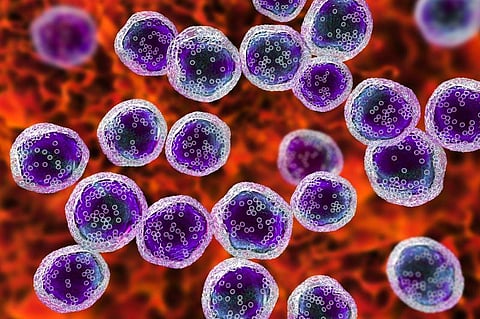TUESDAY, Dec. 12, 2023 (HealthDay News) -- For patients with relapsed or refractory large B-cell lymphoma, including those with comorbidities, the autologous anti-CD19 chimeric antigen receptor (CAR) T-cell therapy axicabtagene ciloleucel (axi-cel) yields five-year progression-free survival (PFS) of 28.5 percent and overall survival of 40.3 percent, according to a study presented at the annual meeting of the American Society of Hematology, held from Dec. 9 to 12 in San Diego.
Jay Y. Spiegel, M.D., from the Miller School of Medicine at the University of Miami, and colleagues reported outcomes of patients receiving axi-cel, including 42 percent who did not meet the eligibility criteria for the ZUMA-1 trial; 298 patients underwent leukapheresis as part of the CAR T-cell process.
The researchers found that median overall survival was 34.9 months after a median follow-up of 58 months, with overall survival of 49.1, 43.0, and 40.3 percent at three, four, and five years, respectively. Median progression-free survival was 8.7 months, with PFS of 36.1, 30.7, and 28.5 percent at three, four, and five years, respectively. Reduced overall survival was seen in association with male sex, lactate dehydrogenase above the upper limit of normal, ECOG status of 2 to 4, and elevated bilirubin >1.5 (hazard ratios, 1.56, 1.6, 2.02, 5.68, respectively). During the follow-up period, 191 PFS events occurred after axi-cel infusion, including 151 due to lymphoma progression and 40 nonrelapse mortality events. Of the 40 nonrelapse mortality events, 21 were secondary to infection and nine were attributed to secondary malignancy.
"We were very encouraged by the results," Spiegel said in a statement. "Often, results from clinical trials don't translate to the larger population. But we were sobered by the rates of nonrelapse mortality and that is where we need to improve."
Several authors disclosed financial ties to biopharmaceutical companies, including Kite Gilead, the manufacturer of axi-cel.
Abstract
More Information


